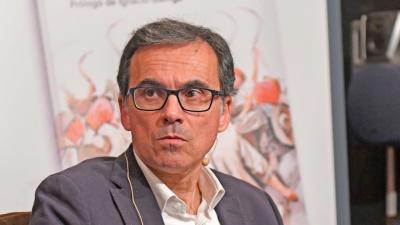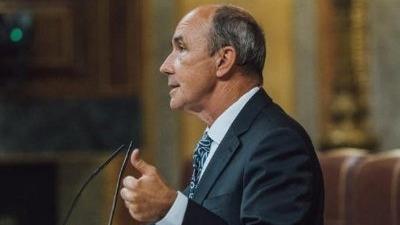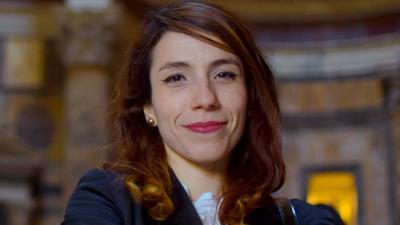Manuel Acosta: “Since the very foundation of Spain, neither Catalonia could be understood without Spain, nor Spain without Catalonia”
Interview with Manuel Acosta Elías, PhD in Hispanic Philology, graduate in Geography and History from the University of Barcelona and VOX MP for Barcelona in the Parliament of Catalonia, where he is the spokesman for the University, Culture and Education Committees. We have talked about his first book: El libro blanco de la historia de Cataluña: 265 cuestiones que todo independentista debería preguntarse (The white book of the history of Catalonia: 265 questions that every pro-independence person should ask themselves).
Álvaro Peñas: What were your reasons for writing this book?
Manuel Acosta: When the unfortunate events of 2017 took place, with the rupturist process and the declaration of independence, I felt very affected. As a Catalan I was logically also Spanish, so I asked myself what I could do in the face of this nonsense. So I thought of reversing this process, contrary to reason and history, by writing a book that would demonstrate with sufficient arguments that Catalonia has always been Spain. Since the very foundation of Spain, neither Catalonia could be understood without Spain, nor Spain without Catalonia.
And what I also wanted was that the book would be accessible to as many people as possible who had a certain interest in the history of Catalonia or who were immersed in the process of separation. That is why the book is written as a compendium of questions and answers. Short questions with brief answers of four or five lines, which makes them easy to read, but not without rigour.
The book is aimed at young people. What history are young people being taught in Catalonia?
We have had 40 years of indoctrination in schools. The history of our region and of our country in general has is being altered at will. In addition to linguistic indoctrination, because of this, in part of the national territory a child cannot be educated in Spanish – which is unheard of anywhere else. What is being done is distorting history and the episodes in which Catalonia has been a protagonist in the history of Spain. This results from the ongoing work of the separatism that has taken power in the region, bringing about just these consequences. Children educated in the Catalan education system have a conception of the history of Catalonia that is far removed from reality and a vision of confrontation, lack of common ground and even antagonism with the rest of Spain, which has logically led to a rise in separatism. The problem is that from Spain, from the State, there has been no warning of this to the Catalan government. For evil to advance, all that is needed is for the good not to react.
An invention that I have seen increasingly repeated, even in books that have been bestsellers in Spain, is that of the Catalan-Aragonese crown. Does separatism want to appropriate the history of Aragon?
There has never been an independent Catalan state, and that is why one of the means to create one is to misrepresent the crown of Aragon. This is done by using the name “Catalan-Aragonese crown”, which neither exists nor appears in any document of the crown of Aragon. The Christian kingdoms, including that of Aragon, have always intended to recover the unity of Spain achieved during the Visigothic kingdom, but ruined by the Islamic invasion. The fact of the marriage of Petronila, daughter of King Ramiro of Aragon, to Ramón Berenguer IV, Count of Barcelona, in 1035 is also used by the separatists. Berenguer was Count of Barcelona, Ausona, Ampurias and Gerona, and a vassal of the King of France. He was not a king, the queen was Petronila, and he did not represent Catalonia, which did not exist at that time. The word “Catalonia” began to appear in documents from 1176 onwards.
Following this thread and citing historical milestones, I find it surprising that separatism wants to disassociate the Catalans from the discovery and colonisation of America.
The truth is that the Catalans were very much involved in it. Columbus’ second voyage had onboard one Bernat Boïl. who was a monk from the monastery of Montserrat. He was the first cleric to set foot on American soil, and founded the first three churches there. He named them Montserrat, Santa Tecla (patron saint of Tarragona) and Santa Eulalia (patron saint of Barcelona). The military commander of that second voyage was Pere Margarit, from Empordà. The first official chronicle of America is the work of Ramón Pané. There is an endless list of names, but this is not discussed in Catalan schools.
There is also a New Barcelona.
Yes, if I’m not mistaken, it’s in Ecuador, and there are a lot of places with Catalan names. The writer Javier Barraycoa has made a detailed account of the extensive Catalan toponymy in America.
The War of Succession is grossly manipulated to ignore the fact that the Catalans were fighting for the Habsburg candidate to the Spanish throne. But how is the War of Independence, with such famous events as the Bruc drummer and the sieges of Gerona, presented?
The first thing the Catalan education system has done is to replace the historical term “war of independence” with “the French war”. From then on, they explain it as a strife for the freedom of the Catalans, but try to differentiate it from the strife in the rest of Spain. So any sign of Spanishness is concealed in popular songs or in the fact that prominent figures in the war were Catalans, such as Agustina de Aragón, Agustina Domenech and Zaragoza, who was from Barcelona. In Girona, Santa Bárbara battalion of 200 Catalan women is worth mentioning. Those women were an example for the resistance in the rest of Spain.
In the middle of the 19th century, in the war in Africa, General Prim and his Catalan volunteers played a fundamental role. I have read that in Catalan textbooks the Spanish flag has been replaced by the Catalan flag in the images of the military campaign.
Yes, that’s right. There are alterations as crude and criminal as these. Falsifications through paintings, illustrations, engravings, etc. The problem is that this is done with total impunity, with no response from the state. And the publishers, if they want to continue selling textbooks, have to submit to political correctness and abandon rigour or objectivity.
The civil war is also presented as a struggle for independence and in a monolithic way, that is, all Catalans support the Republic.
The separatist class that governs us has done the same here as in all other previous cases, presenting Spain and Catalonia as antagonistic. Thus, we are taught that in Spain a totalitarian and fascist movement is triumphing, led by those responsible for the national uprising, but not in Catalonia. In Catalonia there is a united, republican and catalanist society. The reality is different, since, like in the rest of Spain, half of Catalonia was in favour of the Republic and the other half against it. The uprising triumphed in Lérida, Mataró and Figueras, but since it did not succeed in Barcelona, Catalonia remained Republican. Moreover, the president of the Generalitat, Lluís Companys, carried out an atrocious and criminal persecution of dissidents that culminated in the murder of 8,352 people. We should also mention one of the most successful units during the war, the Tercio de Requetés de Nuestra Señora de Montserrat, made up entirely of Catalans. Another little-known, because hidden, fact is the existence of eight Republican concentration camps, which weren’t a cut below German or Soviet camps, with the total of over 10,000 people having passed through them.
So, separatism robs the Catalans of their true history and at the same time promotes organisations like the Nova Historia Institute that defend the Catalanness of Da Vinci or Copernicus, yes.
Yes, these daydreams are ridiculous, but if you have a government that spreads and amplifies them through the administration, schools and subsidised media, then what Montesquieu said happens: "Slander, slander, and in the end something remains". In the end, these reveries acquire a certain weight, however ridiculous they may be.
This book joins many other authors, fortunately more and more of them, in the cultural battle to recover the true history. But is there a solution? After 40 years of indoctrination, do we need another 40 years to defeat all these lies?
Recovering sanity and returning to normality is going to take a long time. Destroying something is relatively easy, it is building that is difficult. In this process of reconstruction, political struggle is necessary and that is why I joined VOX two years ago. But not only this – what is also necessary is the constant activity of the civil society, cultural struggle, denunciation, etc. This will not be easy - it will take a lot of patience and tireless work to get out of the madness and return to rationality.
And a lot of courage, because the aggression against VOX information tents in Catalonia is constant.
There comes a time when you have to take a step forward, because if you don't go forward, you go backwards. First you do it for your children and your loved ones, but by extension you do it for the whole of Catalan and Spanish society. With absolute respect for all people, because it is our sign of identity, we have no reason to remain silent and we are not going to do so. We have suffered these acts of violence for a long time and we know that they will continue to happen because these totalitarian groups act with total impunity, but they will not intimidate us. I see more and more courage, more bravery, more courage and determination to stand up for what we think. In the previous local elections, in 2019, we presented 9 or 10 lists in the province of Barcelona, now we are presenting 82.
Read also
Country Report: Spain & Portugal, February 2023
Spain’s parliament continues to opt for the most radical progressive agenda, and the month of February saw a modification of the abortion law, an approval of the trans law and the first step towards the animal rights law, or animal dignity law, which must be still ratified in the Senate.
Álvaro Peñas
Carolina Barrero: “In Cuba there is no food or medicine, but the regime builds hotels rather than hospitals”
Interview with Carolina Barrero, activist for the defence of human rights in Cuba, self-exiled in Spain since February 2022.
Álvaro Peñas
Francisco José Contreras: “The renewal of the West is the historic task that the New Right must take on”
Francisco José Contreras is Professor of Philosophy of Law at the University of Seville and was a deputy for VOX during the last legislature (November 2019-July 2023).
Álvaro Peñas
Estefanía Meléndez: “Venezuela, like Russia, plays on fear and propaganda, but that can backfire”
Estefanía Meléndez is is a Venezuelan opposition activist who, during Venezuela's presidential crisis in 2019, was appointed by the National Assembly as Venezuela’s ambassador to Bulgaria with “concurrent” work to North Macedonia, Montenegro and Albania.














Comments (0)